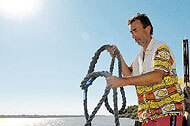LINZ EUROPE TOUR 2007-2009
Obsessed
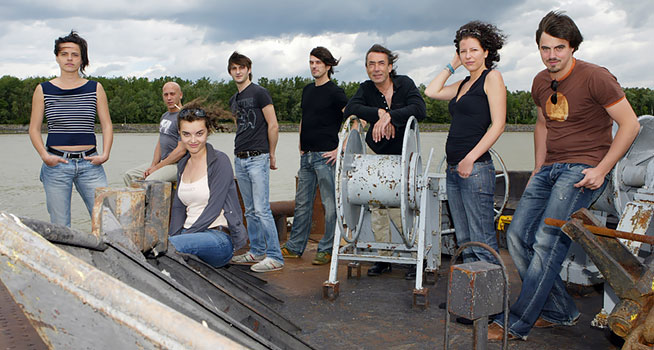
Hubert, you once shouted at a film director, who had commissioned you with a soundtrack, that he should go to a carpet dealer if he wanted a carpet of sound. You can't do anything without passion, right?
If you replace passion with strength, then I'll agree with you. I can't do anything with directors and musicians who can't handle strength. I'd rather have no music at all for half an hour in a film, than some mediocre sound or other that is to suggest atmosphere. When you listen to Enio Morricone you immediately have images in your head. Because this sound is bursting with strength.
Do you have an explanation for your urge for overwhelming strength?
Only my obsessiveness. Mind you, that doesn't go just for music. If I take the trouble to get up and go to an instrument or to a table to do something, then I want to do it properly. When I cook I want to make a feast of it. I really struggle to simply provide for the intake of food for my children. When my children are hungry and I am to prepare something for them, I always ask for an hour. Then it's: "No, now, straightaway! A frozen pizza!" It's terrible!
Are you driven by the urge for perfection?
No, it's the desire for something exciting. Something that grabs you, seizes you and doesn't pass you by so simply. I can't do it any other way. Music is something holy to me. It releases something that lets me fall into the deepest abysses. But it also allows me to feel life in all its beauty and tragedy. Music is like love. I have such great respect for both, that I don't want to play with them in the sense of: "That's ok, nobody will notice if you cheat a bit." I notice and so the problem is already there.
Which implies problems with the musicians in your band, if they don't burn like you do.
When those who stand on stage with me don't have anything to play in certain parts of the programme and I catch them talking to each other, then we have a problem with each other. They're asleep at the wheel. How can we ask for attention from the audience when not even the musicians are paying attention on stage?
How do you react in such moments?
I once bit a musician during a concert. She was standing at the edge of the stage during a part in which she had nothing to play. Since I needed my hands to play I went over to her, bit her and thus drew her back into the centre of the stage.
Do your musicians feel that yours ways are too much for them?
It is perhaps naïve of me, but I ask every musician who wants to play with me not to view their membership in the band as just a job to earn a living. Whoever plays with me should also share my musician's philosophy. The end of the Alpinkatzen was partly down to the fact that at the end my musicians saw me ever more as the one who was responsible for their pensions.
It is possible to surprise you as band boss with a solo, or is it difficult to meet your demands?
Of course someone can do that if they want! After all it's all about interaction on the stage. I'm neither the best instrumentalist, nor the best musical theorist in our group. Nearly every one of them is better on his or her instrument than I am on mine.
Which instruments do you play on stage?
Guitar, accordion, a few brass instruments and I play the piano for composing too. What I have over my musicians is the intensity of the experience of the moment, of being right here. But it's not anything they can't learn. And if they don't want to, then they're not the right ones for my band.
Your music has changed from the time of the Alpinkatzen to today, although you avail yourself of the same technical means. Sometimes your audience has no idea what to expect at concerts. Your tours are nevertheless always sold out.
It's probably down to passion. At the risk of sounding populistic; the audience isn't stupid. When I notice as a listener how mellow musicians can be on stage, I can't stand it. Why does someone have to distance themselves from what they are doing through coolness or some affected behaviour? It would be better if he didn't do it at all. This being ashamed of what means something to you is sickening. Of course emotions can be unbelievably destructive too. If you can kick yourself into something so far that it brings you great joy, pain has to be accepted too. If it doesn't work, you become numb, perhaps even maladjusted. Life passes you by. Aren't there a plethora of examples in music history?
What will the concerts be like? Will you be making completely impromptu stops and looking for local musicians, or have you made preparations?
Both. I have twice travelled the stretch that we are now covering with the boat, that is following the Danube down to the Black Sea, to find out with whom I can do this and with whom I cannot. There are of course musicians in the countries we're travelling through, who don't want anything to do with tradition. Their motto is quite clearly: Go West. I can't get on with that, even if I understand their motives. I want to play with people who are conscious of the musical tradition of their region. Mind you, the way I am conscious of mine. I know it, like it, but want to use it with my language and my means, so that it does not degenerate into stereotypical folklore. The concerts will be exciting in so far as I don't know exactly what our guests will be playing. I have only a rough concept.
And what if they want to play Lambada?
Then they should play it. As long as there is passion, it's fine by me. But I bet their Lambada sounds hardcore and angular, almost like punk. So much for spontaneity at the concerts. We have planned this stage in as much as, at least in the larger cities, you can't simply turn up and thus perhaps put off the officials in the different municipalities. But on the other hand we are expecting several thousand people at each concert, who will watch us from the shore. Aside from that I am of course looking forward to impromptu gigs when we moor somewhere to stay the night. We have deliberately left ourselves open for such opportunities.
You have played previously in Egypt and Africa. How de facto transboundary is music, if you leave out the pervasive wish for multiculturalism?
It does actually bring down barriers amazingly quickly. Mohamed Mounir, our Egyptian friend, had difficulties in the beginning with how our alpine panorama would do on the banks of the Nile. After we had then played concert with him and his band in Egypt and Germany he was very sad at the provisional end of the exchange. Because he had seen that it is an enrichment when the barriers fall. We are ultimately not as unfamiliar to each other as we think. It has been a long time since the accordion was an unknown instrument in Egypt. And with it, not only an instrument from the Hohner company has been sent to the Nile, but also a complete musical philosophy. It's the same vice versa too. Where do our drums and our philosophies of rhythm come from then? Not from Austria and not from Germany. I want to abolish these daft fears we have of each other, without levelling anything.
What remains from the journey
Hubert von Goisern looks a little sad. Or tired. The final concert last night in Linz was great; one of many successful concerts. He wants to quickly do a few things on board before the interview he says. When you see him this way, him and the people who were on this great journey with him, the way they carry their rucksacks and cases and boxes and joke a little, smiling with their suntanned faces or hugging, then you get an idea of how intense the time on the ship must have been.
For how long were you on the ship?
We started on 22nd June - so two and a half months.
Two and a half months all in one go?
If I count up the amount of time I was on land, it wasn't even twelve hours. My comrades were often on "shore leave" and then told me what they had experienced, always with a smile on their lips. But I liked being on the ship - and in the water too. I certainly spent more time in the water than I did on land, I went swimming as often as I could. The water is amazingly clean, the Danube is such a beautiful river. I wanted to jump in quickly today too, but there isn't time.
How does it feel to travel on a ship?
Great. Simply great. It's the best way of travelling, better than on foot. Anything else is too fast. It's like the minute hand on a clock - when you watch it, you can't see it moving. When you look again after a while, it's suddenly somewhere else. It's a similar case on the ship. You don't feel the movement and yet you feel you're going forwards. As if in slow motion.
The rediscovery of slowness ...
If you like. I've also heard from people who were involved in a shipping accident how strangely slowly even this takes place. You watch for minutes as two ships float towards each other and you can't do anything about it - until it crashes. Such a ship is such a force, an enormous solid piece.
But you didn't have a shipping accident, did you?
No, we have all returned safe and sound. I'm grateful, because there are dangers enough on the ship. That is one hazard. On deck it's often slippery from the spray and there are ropes stretched everywhere and steel cables - different somehow every day, so you can't really get used to them. You always have to be alert, concentrating. The Danube has quite a power, many have drowned.
Can you feel the waves, do they rock the ship?
A little, yes, more on the little barracks ship. On stormy nights a few left their cabins and settled down to sleep on the "village square", our centre on the concert ship.
How big were the cabins?
2 x 3 metres, so 6 square metres. That's quite enough. I didn't hear anyone saying they were suffering, or that it was too small. There were enough places on the ship, the roof for example, to where you could withdraw and be alone. You very quickly developed a feeling for the others and learned from body language whether someone wanted their peace, or company.
So no cabin fever on board, no fights, no discords ...
We had stressful situations and arguments. But nothing that remained long or subliminally and ruined the atmosphere. It's the only way it works. It was such a wonderful journey. We tried to enjoy every river kilometre and - for the most part - we managed it. It sounds romantic, but that's the way it was.
What was the best thing as far as you are concerned?
The best were the concerts. We fevered for the concerts, used every day when we approached our concert venues, rehearsed, developed the programme, shared with the guest musicians. Every concert was different, but every time we were very enthusiastic afterwards. We then sat together on deck for a long time and enjoyed it together.
Sounds like fun.
What can I say - we had a good time. Of course I had also looked for people who are fun and who like company, and who are young. I think it's connected to youth, they can gain something more from such a life than an old boy or girl can.
Were there disappointments?
Yes, of course. We expected more from the concerts in the big cities. Some of them were not well-attended. But that's just the way it is. It's easy to go under among the many cultural offerings in the big cities. In the little villages we were simply the attraction, they'd never seen anything like it.
So it was a real adventure for those on the river banks ...
Yes, and for us too. There were all these things we'd never come across before: new countries, new languages, new places, new music. And above all: permanently being outside, when do you have that nowadays? We were on deck the whole day long, it was much too hot in the cabins, but apart from that, why sit around inside, outside is where everything is happening. You smell the river, look for the clouds, feel how the weather is turning. And when it rains, you just put your hood up and carry on watching what happens. It was funny: after a certain time nobody cared about the weather forecast any more. What will be will be.
And the heat?
It accompanied us through Bulgaria and Romania - two weeks of it being 45 degrees in the shade. As the ship was iron, you couldn't go barefoot any more, not even on the wood.
So the trip was an experience in nature too.
And what an experience. The alluvial forests behind the flood dams as we know them, as they are only like that here. The riverbanks far south look completely different. In Hungary come the first long shingle beaches, the shingle is then ground ever finer, then come sand beaches, often kilometres long. Aside from that there are tributaries, huge sand banks, islands full of birds, meadows ...
And no people far and wide ...
Not at all - the people there use the river, live on the river, they fish and grill and camp, lie in the sun and watch the water. It's unthinkable at home.
The rivers are rather regulated here.
And cast in concrete and stone. There is the Danube Park in Linz, but Vienna turns its back on the Danube, it flows through a concrete basin in Budapest too. But the further east you go, the more the cities open themselves up to the Danube, the river becomes freer. It's all very regulated here, not just the river, but life on the river too, down there things are more chaotic, more spirited. There's a pulse in the cities, they have their beaches and terraces and cafés on the river. It was especially noticeable in Novi Sad.
Did you have the time to stop and drop anchor at especially beautiful spots?
That happened - yes. When it was hot we had to swim. Mostly we anchored shortly before sunset, went swimming and then we carried on at 4am the next morning.
You set off to overcome boundaries with your music. Did you succeed?
I think so. Together with our native guests, we were something like a catalyst: something happened at our concerts and on the way there, on board, people met, encounters happened beyond language barriers and country borders and musical styles. Perhaps through this the understanding for one another grew a little here and there. What do I mean 'perhaps' - definitely!
And you could destroy prejudices, fears yourself too?
I think so. I have been convinced once more that there are open and closed natures everywhere. Of course the people in south east Europe are different from people here, it's exciting that way, but they also dance to music and are pleased with a successful concert. They live on the same river as the people here, thousands of kilometres upstream, and it is all Europe. I'm proud and pleased and want it all to belong to Europe, I want us to develop a feeling for how great, and how bright and how unique this Europe is.
That is also why you went on this journey, because you, as you said beforehand, "want to meet people who are like-minded". Did you manage?
Yes. They were mostly our musical colleagues, because I wasn't on land very much. But I had met people beforehand, when I drove through the countries in the car, who showed me a piece of their world, a story, a landscape, a moment from their life that comes from the heart, with the little tip, "come again, then I'll show you more".
You were travelling as an ambassador for the Capital of Culture. Is there a message that you have brought back from your journey to Linz?
Yes, there is. It's quite simple: don't be afraid. Europe is beautiful and full of adventures, full of facets. Only when I've worked it all through in my own head can I tell you more.
And this processing is coming up now, isn't it? How do you go about it?
No idea. For now I'm looking forward to the mountains and to walking. I still want to avoid it a little. And then I'll see what remains from the journey. From the many contacts and meeting and possible projects for the future. It will take a while until all the great waves have hit the shore. Apart from that, the next part of the tour has to be planned. In 2008 the tour goes west, there's not long now.
"I'm looking forward to the mountains and to walking"
In the Lentos Museum in Linz Hubert von Goisern took stock of his ten-week tour through eastern Europe for the Capital of Culture
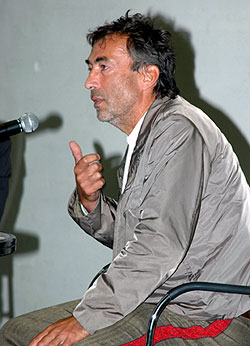 "Have
no fear!" With this message the ambassador for the Capital of Culture
Linz 2009 returned from his ten-week tour through eastern Europe to Upper
Austria and the Lentos Museum on Monday evening.
"Have
no fear!" With this message the ambassador for the Capital of Culture
Linz 2009 returned from his ten-week tour through eastern Europe to Upper
Austria and the Lentos Museum on Monday evening.
With his journey on a concert ship on the Danube he wanted to contribute to "developing a feeling of how great and bright and unique this Europe is," said Hubert von Goisern in the public discussion with Linz 09 manager Martin Heller, for which 250 people turned up. Before the summation began the audience were given a premiere: a trailer for the ORF documentary about Goisern's Linz Europe Tour, which will be broadcast in the spring.
It will be a long time before "all the great waves have hit the shore," the singer believes and he is happy to have arrived safely back in Linz with his 28-member crew. Now he wants to see what will arise from the many contacts made during the journey for future projects, Goisern said two days after his concert in the Donaupark in Linz.
The 54-year-old said that his concerts were well-attended, despite a lack of media support in many places. In Orsova in Romania for example, 2500 people turned up despite no promotion.
In the little villages the shows were "simply the attraction", in the big cities he expected more. Also negative: scepticism, no local support and a number of musicians who didn't get the project.
Goisern told of the slowness of travelling by ship, which sets up its very own rhythm. Of a storm that almost put paid to the tour. Of a concert that was relocated at the last moment from the quayside of an expensive hotel to a public beach, so that everybody could hear it, not just the affluent guests.
In 2008 the folk musician and ethno rocker will be travelling the Rhine Main Danube Canal with his concert ship, all the way up to Rotterdam. But for the time being he is happy to be home again: "I'm looking forward to the mountains and to walking".
"Have no fear!"
Von Goisern sums up with Heller
What had been planned was a discussion taking stock with Hubert von Goisern and Linz 09 manager Martin Heller of the first part of the musician's Linz Europe Tour. What it became was actually a thrilling account of experience and atmosphere, which amazed those in the Lentos auditorium in Linz and often made them laugh too.
Hubert von Goisern recalled how as it went upstream the concert ship was overtaken by an old woman on a military bike and dryly commented that: "you should travel that way if you're in a hurry". The cosmopolitan declared the greatest luxury of the journey to be the slowness of the Danube. With terra firma beneath one's feet it takes a while to get used to life on land again.
A journey with problems too
"I think we didn't do anything to shame you and we took some things along with us that I think could let some seeds grow," the Upper Austrian continued. However he did not bring back only fruitful cultural exchange, but also the recognition that in several places his project did not necessarily receive positive support from politicians.
For part two of the tour, going westwards in 2008, he hopes to be able to do everything right. In conclusion manager Heller encouraged people with the words, "Have no fear, Linz!"
Hubert von Goisern: Live in Linz - 1st September 2007

Hubert von Goisern: Live in Linz - 1st September 2007
Photo: © Elli Christl
Hubert von Goisern: Live in Linz - 1st September 2007
Photo: © Elli Christl
Hubert von Goisern: Live in Linz - 1st September 2007
Photo: © Elli Christl
Hubert von Goisern: Live in Linz - 1st September 2007
Photo: © Elli Christl
Hubert von Goisern: Live in Linz - 1st September 2007
Photo: © Elli Christl
Hubert von Goisern: Live in Linz - 1st September 2007
Photo: © Elli Christl
Hubert von Goisern: Live in Linz - 1st September 2007
Photo: © Elli Christl
Hubert von Goisern: Live in Linz - 1st September 2007
Photo: © Elli Christl
Hubert von Goisern: Live in Linz - 1st September 2007
Photo: © Elli Christl
Hubert von Goisern: Live in Linz - 1st September 2007
Photo: © Elli ChristlBack again with friends
Finale concert on the east tour on 1st September 2007 in the Donaupark, Linz
Hubert von Goisern and friends celebrated the musical finale of the first stage of the Linz Europe Tour with a furioso concert at the home port in Linz.
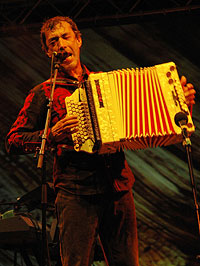
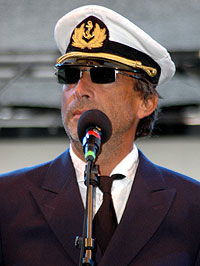 8000
people came to the floating stage in front of the Brucknerhaus, despite
the bad weather forecast. "We have experienced so much that I have
to process it all first. said Goisern and ceded the stage for the first
two and a half hours to his musical friends, who had been among those
on board: the Hohtraxlecker Sprungschanznmusi from
Bad Ischl impressed with a fresh interpretation of alpine folk music.
With Rambo Amadeus, the singer, songwriter and guitarist from Montenegro,
his turbo folk infected the Linz audience without them needing to understand
the lyrics.
8000
people came to the floating stage in front of the Brucknerhaus, despite
the bad weather forecast. "We have experienced so much that I have
to process it all first. said Goisern and ceded the stage for the first
two and a half hours to his musical friends, who had been among those
on board: the Hohtraxlecker Sprungschanznmusi from
Bad Ischl impressed with a fresh interpretation of alpine folk music.
With Rambo Amadeus, the singer, songwriter and guitarist from Montenegro,
his turbo folk infected the Linz audience without them needing to understand
the lyrics.
Together with the world's first female gadulka player Darinka Tsekova from Bulgaria, Hubert von Goisern and his band thrilled the crowd in the Linz Donaupark until late into the night. Together with his friends Hubert von Goisern brought the first stage of the Linz Europe Tour to an atmospheric end with Heast as net.
The first stage of the Linz Europe Tour 2007 - 2009 is complete
For two and a half months Hubert von Goisern travelled the Danube with his band, down to the Black Sea and back again, as ambassador for the Capital of Culture Linz. He gave 22 concerts in 10 countries together with local artists - with the aim of using music as wordless communication that overcomes boundaries. On 1st September 2007 the convoy finally reached its home port of Linz for a grand finale concert.
To be continued in 2008
The second stage of the tour follows next year. This time it will lead west along the Danube, Main and Rhine, up to Rotterdam. In 2009 the tour will have its final high point with a festival in Linz harbour with all the artists who have taken part in the project.
Hubert von Goisern: Live in Bratislava - 29th August 2007

Hubert von Goisern: Live in Bratislava - 29th August 2007
Photo: © Sarah Marchant
Hubert von Goisern: Live in Bratislava - 29th August 2007
Photo: © Sarah Marchant
Hubert von Goisern: Live in Bratislava - 29th August 2007
Photo: © Sarah Marchant
Hubert von Goisern: Live in Bratislava - 29th August 2007
Photo: © Sarah Marchant
Hubert von Goisern: Live in Bratislava - 29th August 2007
Photo: © Sarah Marchant
Hubert von Goisern: Live in Bratislava - 29th August 2007
Photo: © Sarah Marchant
Hubert von Goisern: Live in Bratislava - 29th August 2007
Photo: © Sarah Marchant
Hubert von Goisern: Live in Bratislava - 29th August 2007
Photo: © Sarah Marchant
Hubert von Goisern: Live in Bratislava - 29th August 2007
Photo: © Sarah Marchant
Hubert von Goisern: Live in Bratislava - 29th August 2007
Photo: © Sarah Marchant
Hubert von Goisern: Live in Bratislava - 29th August 2007
Photo: © Sarah Marchant
Hubert von Goisern: Live in Bratislava - 29th August 2007
Photo: © Sarah Marchant
Hubert von Goisern: Live in Bratislava - 29th August 2007
Photo: © Sarah Marchant
Hubert von Goisern: Live in Bratislava - 29th August 2007
Photo: © Sarah Marchant
Hubert von Goisern: Live in Bratislava - 29th August 2007
Photo: © Sarah Marchant
Hubert von Goisern: Live in Bratislava - 29th August 2007
Photo: © Sarah MarchantKilometre 1879, home again
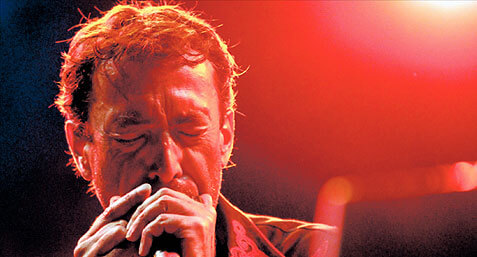
Today, Saturday, the first stage of Hubert von Goisern's "Linz Europe Tour" ends with a concert in Linz. A report.
The journey goes slowly upstream. The Danube offers natural resistance. Power plants and locks artificially strengthen. The slow tempo is good for thoughts, they are trailing anyway. Thoughts might be of the imminent return home. The first meeting on dry land might be arranged by mobile phone. But the experiences of the past few months offer the frame of reference for all conversations.
"No idea what life will be like afterwards", says Hubert von Goisern. "I am coming back from a journey. But above all I am returning from the water. I've only spent a few hours on land, I always slept on the ship. I can always hear the noise of the Danube and the creaking of the boat. I can't imagine being without that at the moment." The Danube, this internal kingdom, that "in terms of Europe too," as he understands it, "must remain a free river that easily overcomes any kind of boundary" was his home.
Hubert von Goisern, his band and the ship's crew have lived on board since the middle of June. They have united ten countries with their music along the stretch of the first part of the three year "Linz Europe Tour" (see box). Next year the tour will go northwest on the Danube, Rhine and Main. "I can't think about that yet," says Hubert von Goisern and looks through the rainy night towards the black river.
It has been Goisern's hitherto longest tour. "I have never been away so long at a stretch. There have been more concerts per year, but there were always days in between on which you come home. I've never been as far away as on this journey."
29 concerts. About a dozen languages. Numerous, random memories remain - of the landscape of the delta, the oppressive heat in the lowlands, through which the river flows in Romania and Bulgaria. Of warm receptions, of political inconsistencies and incomprehensible treatment of ethnic minorities. Of intense encounters with local artists. But also of snapshots as some bands only came on board for the show. Of unplanned, impromptu appearances in small villages like Donji Milanovac. "It was arranged one day before. The whole village was on its feet. Wonderful", says violinist Marlene Schuen.
There were bitter moments in the population centres. There were poorly organised, barely promoted and thus poorly attended shows in large cities. Errors were made here. "Our own first, because we should have engaged different people and chosen a different strategy." The free concerts had a disadvantage in that "any financial incentive to put their back into it" disappeared for local organisers.
Nothing that is over has to be past too
A few hundred people came to the concert in Bratislava last Wednesday, the last outside Austria. Once more the local organisers in this city have done little, if not failed. The musical performance remains unaffected.
A few new versions of songs have developed in the "best of" programme, which draws from nearly 20 years of Goisern creativity, like Neuer Tag for example. The hope-giving ballad about the ambivalence that nothing that is over has to be past too - now enriched with melancholic choir passages sung in Ladin and the guest musician Darinka from Bulgaria - grew to a bewitching statement for the whole project.
All the shows are begun with a packet of older songs, in which the quintessence of the Goiserer's breadth can be understood: alpine tradition, treated with respect, but by no means protected to death, but offered with elements of rock, pop and jazz and the aggressive attitude of a self-assured performer. The Goiserer and his band play powerfully from the ship to the people on land. The show in Bratislava supports the picture of a brilliantly tuned, still highly concentrated troop.
River kilometre 1879. Most are still sleeping. A fanfare from the cow horn blasts into the grey sky while the crew hoist the flag. The flag of the territory in which one is sailing has to fly at the bow. Past the Slovakian Devin fortification, the border to Austria is crossed. There are about 40 hours of travelling from here to Linz. It is raining. The heat of the previous weeks - "we travelled nearly the whole way through a one-in-a-century summer" - gives way to the harbingers of autumn. Home again. Or still far away?
Lots of ships, lots of adventures, new worlds
The journey towards home is always slow, because the rucksack of memories is heavy. The rain chases everyone away from the village square, which for weeks was the centre of communications, rest and eating. In the now unused guest cabin a football tournament is being played on the Playstation. In the mess film for the planned TV documentaries are being studied. Then the sky rips open over the Wachau. On the penultimate morning on the ship the sun still sends down warming rays. A mighty passenger ship with the name "Austria" passes by the Goisern-convoy.
Those on board have too many ships, too many adventures, too many new worlds in their heads for the "Austria" to be worth noticing. Their memory cells are full. Flooding in the basins of memories and feelings. "Look at that ship there. They come from Constantia. Black Sea", Marlene Schuen called attention to the noble ship at the neighbouring pontoon a few hours before a short stop in Vienna. The tone of voice and slight glistening in the eyes betray melancholy. A few hours until home. But the melodies still sound as if they come from somewhere completely different.

